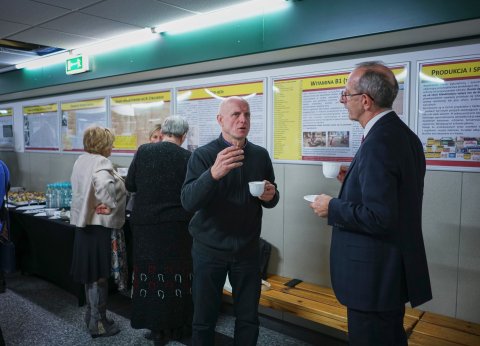Why is difficult to commercialize innovation idea in Poland? Is it impeded by our mentality and lack of trust in society? Do we have enough knowledge and skills to develop innovation? And are we supported properly by projects evaluators and government? These questions were discussed by participants of the 4th RAIN meeting in Poland in terms of agroforestry innovation.
On 24th January 2019, 26 Polish RAIN members met at University of Life Sciences in Warsaw to reflect on that matter. 11 of them were practitioners. Chief broker of Agricultural Advisory Centre, Mr Ireneusz Drozdowski presented EIP Operational Groups (OG) selected by evaluators under the first call. 17 OG have been positively evaluated, however in practice only 8 consortiums have been established. Only one innovation was relevant for agroforestry, the „Agroforestry in Zielava Valley” OG has been considered as one of the best EIP group in Poland. The group development has been addressed by AFINET Innovation Broker Małgorzata Gałczyńska and farmer Barbara Baj-Wójtowicz. The second Polish EIP group, related to “ecological” innovation is focused on bringing traditional form of wheat back into production market. Other agroforestry relevant operational groups from EU were presented by Robert Borek from IUNG-PIB. Additionally, Marcin Wójcik from Beef Cattle Producers „Pastwisko” (Beskid Niski mountains) presented innovative at Polish scale silvopastoral activities, carried out on his farm.
RAIN members held a lively debate on opportunities for introducing and commercializing agricultural innovations in Poland. The key challenge is to find a leader, since there is still a lack of trust in Polish society, affected by experience of Communism. Expectations of farmers are directed at investment to modernize agricultural holdings, so far mostly to purchase new equipment while strong investment in human capital through better education and skills is needed. Performance of Operational Groups poses a big challenge in Poland in terms of provision of governmental guarantee for the advance payment to farmer, issue of the promissory note for the total amount of payment for each partner and refunding system. Proposal of changes in laws are proceeded by the Ministry of Agriculture.
The success of agricultural innovation is depending on effective way of presenting innovative idea to farmers to inspire them to comprehensive sustainable approaches. Agroforestry can contribute to the creation of positive image of the farm. Both strengths and weaknesses of innovations might be advantage at the sale offer targeted at certain customers, but innovation should serve to future generations.












